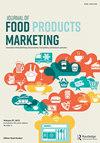营销加工有机食品:促销信息框架(恶习Vs.美德广告)对健康认知的影响
IF 2.4
Q2 BUSINESS
引用次数: 10
摘要
研究表明,与传统食品相比,加工有机食品的健康程度可以通过宣传信息框架的细微变化而改变。美国有机食品消费者样本(N = 375)通过突出产品的优点或缺点来展示加工有机(和加工传统)食品的广告。加工食品的类型(有机的,非有机的)和促销信息的类型(缺点,优点)之间的相互作用被观察到。只有当广告强调产品的反面时,人们才会认为加工过的有机食品比非有机食品更健康。在看了带有美德框架的广告后,人们认为有机产品和非有机产品同样健康。结果是在概念上使用不同的恶和善产品进行复制,而不是将同一产品定义为善和恶。论文最后提出了设计和报告结果的理论、实践和方法含义。本文章由计算机程序翻译,如有差异,请以英文原文为准。
Marketing Processed Organic Foods: The Impact of Promotional Message Framing (Vice Vs. Virtue Advertising) on Perceptions of Healthfulness
ABSTRACT The study shows that the perceived healthfulness of processed organic foods, compared to their conventional counterparts, can be altered by slight variations in how promotional messages are framed. A sample of US organic shoppers (N = 375) was exposed to advertisements promoting processed organic (and processed conventional) foods by highlighting either virtue or vice aspects of the products. An interaction between the type of processed food (organic, non-organic) and the type of promotional message (vice, virtue) was observed. Processed organic foods were perceived as more healthful than non-organic equivalents only when advertisements emphasized vice-related aspects of the product. Following exposure to virtue-framed advertisements, organic and non-organic products were seen as equally healthful. The result was replicated conceptually using different vice and virtue products, rather than framing the same product as virtue and vice. The paper concludes by presenting theoretical, practical, and methodological implications of the design and reported findings.
求助全文
通过发布文献求助,成功后即可免费获取论文全文。
去求助
来源期刊

Journal of Food Products Marketing
BUSINESS-
CiteScore
5.70
自引率
6.90%
发文量
17
期刊介绍:
From food promotion and advertising through new food product development and consumer behavior research, the Journal of Food Products Marketing provides timely, practical articles that keep food marketers on the cutting edge of their profession. The journal includes refereed research studies as well as opinions, guidelines, and speeches by practitioners that contribute to the better practice and understanding of food marketing. The journal provides a single forum for both food marketing academicians and food marketing practitioners.
 求助内容:
求助内容: 应助结果提醒方式:
应助结果提醒方式:


